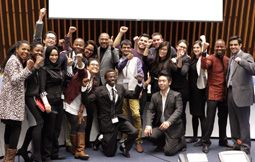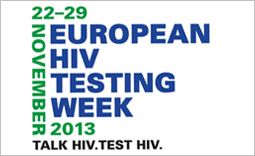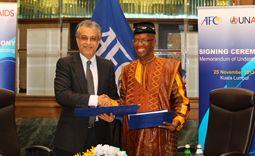
Feature Story
UN Secretary-General presents progress report on AIDS response
11 June 2012
11 June 2012 11 June 2012
Credit: UNAIDS
At the 66th session of the General Assembly held on 11 June in New York, United Nations Secretary-General Ban Ki-Moon introduced the 2012 report on the progress made in the implementation of the Declaration of Commitment on HIV/AIDS and the Political Declarations on HIV/AIDS.
Mr Ban highlighted the bold targets included in the 2011 Political Declaration adopted by countries during the last high level meeting on AIDS as well as the intensified efforts made by all partners in the AIDS response over the past year.
Through the 2011 Political Declaration, UN Member States pledged to deliver antiretroviral therapy to 15 million people by 2015, eliminate new HIV infections in children, achieve a 50% reduction in new HIV infections among adults, reduce transmission of HIV among people who inject drugs by 50% and reduce TB deaths in people living with HIV also by half.
The progress report outlines a number of recommendations that need to be implemented to reach the 2015 targets. For instance, to meet the target of reducing sexual transmission by 50%, the report outlines that the number of new sexually transmitted HIV infections will need to decline by at least 1 million by 2015. To achieve this, HIV prevention programmes need to enhance efforts to reinforce, sustain and extend behaviour change by promoting gender equality and mutual respect, as well as better focus on where the new infections are occurring. “We can only reach that goal if we reach out to people at risk: sex workers, men who have sex with men, people who inject drugs, women and youth,” said Mr Ban.
The Ambassador of Angola, Mr Ismael A. Gaspar Martins, speaking on behalf of Southern African Development Community (SADC), noted the major progress made on scaling up antiretroviral therapy and reducing new HIV infections since the High-Level Meeting took place. "But with less than 4 years remaining, the current response may not result in the HLM targets to be reached," he warned.
We must strengthen existing financial mechanisms, including the Global Fund, even as we search for new sources of sustainable financing
United Nations Secretary-General Ban Ki-Moon
The Secretary-General put special emphasis on the needs of women and girls. “Women need sexual and reproductive health services,” said Mr Ban “HIV-positive mothers must have antiretroviral drugs so their babies will be born HIV-free,” he added.
According to the Secretary-General, countries should support the Global Plan to Eliminate New HIV Infections among Children by 2015 and Keep Their Mothers Alive. This Plan can quickly deliver the results needed for the Every Woman, Every Child initiative. Both are generating real commitments from governments, health experts, activists, business executives and other partners.
Addressing the needs of women and girls, ending stigma and discrimination and reaching the 2015 targets require funding. Mr Ban called for all countries to do their part. “We must strengthen existing financial mechanisms, including the Global Fund, even as we search for new sources of sustainable financing.”
In his report, the Secretary-General underscores that achieving the 2015 goals will require a redoubling of efforts from all stakeholders and that if smarter and more efficient ways of working are not applied to the AIDS response, the goals will not be met.
“The fact is that without immediate change in the way we work, there is the risk that we will not reach these targets,” said Ambassador Gary Quinlan of Australia. “I am alarmed that very few countries have incorporated the HLM targets into their national plans. My own country needs to do much better. UNAIDS should take additional efforts to achieve this by mid-2013,” he added.



